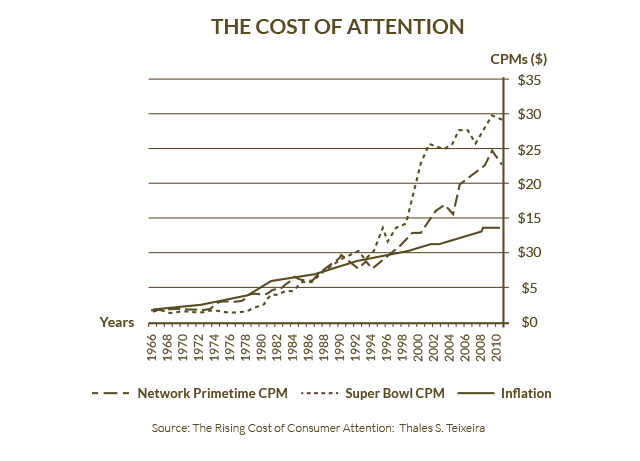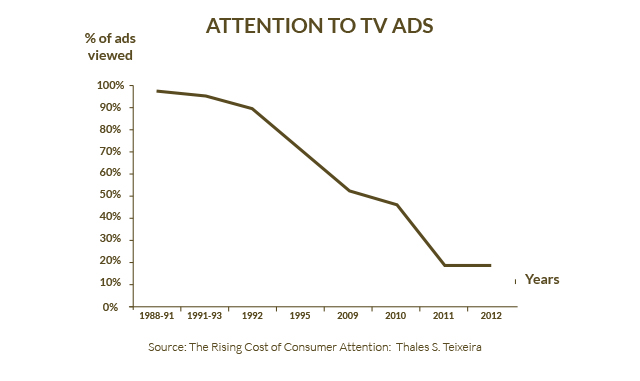Unlock the Magic in Your Story Now
Get the Free 20 questions to Ask Before Launching Your Idea workbook when you sign up for occasional updates.
Get the Free 20 questions to Ask Before Launching Your Idea workbook when you sign up for occasional updates.
There’s More Than One Way To Tell Your Story
filed in Marketing, Storytelling, Strategy
 In 2004 Chanel paid $33 million for the production of a two minute film which became the most expensive advert ever made. In a post GFC economy that figure seems shocking, but Chanel is one of the most valuable global brands. They have the marketing budget and they’re not afraid to use it.
In 2004 Chanel paid $33 million for the production of a two minute film which became the most expensive advert ever made. In a post GFC economy that figure seems shocking, but Chanel is one of the most valuable global brands. They have the marketing budget and they’re not afraid to use it.
Dropbox was founded four years after the Chanel advert aired and has grown to a 300 million user base with a $10 billion valuation by using a clever referral and social sharing reward marketing strategy. Instead of paying to talk about their product Dropbox solved a problem and then rewarded happy users with extra storage when they referred friends.
In a world where social capital increasingly drives the results of companies who thoughtfully connect with their customers it’s time to ask ourselves some tough questions about how we go about influencing the people we serve.
Permission marketing and lower barriers to entry mean we have more opportunities than ever to reach people—but just because we can doesn’t mean we should. There’s a difference between having something to say and having either the opportunity or the budget to say it.
Our companies, non-profits and businesses are judged more and more not by what they sell, but by how and why they sell it. What we stand for is as much a differentiator as what we make. It turns out that there is more than one way to tell your story.
Image by Andrew Ferguson.
Share this article
Pick One Thing
 When you think of Apple you immediately think about great design. You are reminded that Apple chooses to lead with design even in the moments between the moments that matter to you as a customer. It’s hard not to be in awe of a company that cares so much about your experience that they make the packaging feel like a gift.
When you think of Apple you immediately think about great design. You are reminded that Apple chooses to lead with design even in the moments between the moments that matter to you as a customer. It’s hard not to be in awe of a company that cares so much about your experience that they make the packaging feel like a gift.
Patagonia leads with transparency. It’s not always easy to tell your customers the truth, but once you make that decision every subsequent decision becomes easier.
Zappos chooses to lead with service. This choice underpins everything they do, from who they hire to how they treat their staff and customers.
Peter and Anca lead with love. They don’t make the most candles and they hug their customers every day.
The secret of all great companies (big and small) is that they choose. They understand how they create value and they do it on purpose, with intention.
What are you choosing to lead with?
Image by Amanda Tipton.
Share this article
Who Is Your Customer?
filed in Marketing, Storytelling, Strategy
 Joan works as a personal trainer at the local gym. She looks old enough to be someone’s grandma, but I don’t think she is. Unlike most women her age who live around here Joan doesn’t wear a wedding ring. She visits the same cafe for breakfast every day, but not at the same time because some days she has a client at 5.30am. On those days she goes straight to the cafe afterwards. She always eats alone, drinks a skinny latte and normally has toast. When she decides to ‘mix it up a bit’ she tells the staff she’s in the mood for a change today. She seems to struggle with her weight and wrestles with herself over whether to spread butter on her toast—some days she doesn’t.
Joan works as a personal trainer at the local gym. She looks old enough to be someone’s grandma, but I don’t think she is. Unlike most women her age who live around here Joan doesn’t wear a wedding ring. She visits the same cafe for breakfast every day, but not at the same time because some days she has a client at 5.30am. On those days she goes straight to the cafe afterwards. She always eats alone, drinks a skinny latte and normally has toast. When she decides to ‘mix it up a bit’ she tells the staff she’s in the mood for a change today. She seems to struggle with her weight and wrestles with herself over whether to spread butter on her toast—some days she doesn’t.
All of the staff at the cafe know her by name and they don’t seem to mind when she reminds them that they have forgotten to turn the music down, or the lights on. Joan doesn’t sit at the same table every day like some of the other regular customers. That tiny decision is her way of telling herself she’s not stuck in a rut. She lives close by because it’s not the kind of place people visit every day unless they have a reason to come and the cafe is not the kind of place people drive across town to experience. But then Joan is not really here for coffee and toast.
If I were the cafe owner I’d be working harder to make Joan feel like I cared that she showed up every day. I’d want to show her that she mattered.
Tell me about your customer. Not just her age, income and postcode—but tell me who she really is.
What keeps her awake at night? Where does she spend her time both online and offline? What does she care about? Tell me about her fears, hopes and dreams. What matters to her?
Tell me everything you know. Find out what you don’t.
If we don’t take the time to really see our customers and get to know their story, how can we create the things and experiences they want and need? They are giving us clues every day, we just need to open our eyes and more importantly our hearts.
Image by Charles Roffey.
Share this article
How To Be Great
 Dr Dre and Jimmy Iovine don’t make great headphones because they know the most about headphones. They make great headphones because they understand how music should sound and more importantly, they know that people want to feel, not just hear when they listen to it.
Dr Dre and Jimmy Iovine don’t make great headphones because they know the most about headphones. They make great headphones because they understand how music should sound and more importantly, they know that people want to feel, not just hear when they listen to it.
“The right song at the right time will give you a chill. Make you pull someone close. Nod your head. Sing in the mirror. Roll down the car window and crank the volume to the right.”
—Ian Rogers, CEO Beats Music
Our best ideas and innovations are not born from simply wanting to make them great.
We make them great by understanding who they are for and why they should matter.
Understanding what makes people tick and why is far more valuable than we think.
Share this article
No Business Is In A Market Of One
 When dance partners compete they know the other couples are there on the dance floor with them, but they never focus on what the competition is doing. Instead they relentlessly hone each move and perform it for the audience as if it were their only chance to dance the dance. They don’t allow the fact that they are competing to stop them dancing.
When dance partners compete they know the other couples are there on the dance floor with them, but they never focus on what the competition is doing. Instead they relentlessly hone each move and perform it for the audience as if it were their only chance to dance the dance. They don’t allow the fact that they are competing to stop them dancing.
It’s our competition’s job to compete and yet we’re often surprised when they do. We complain when ideas are stolen or replicated. We spend at least as much time looking over our shoulder at the competition as we do on practicing our steps in readiness for the performance.
What would the world look like if you focused on doing the work as if today was the last time you would get to do it?
You can allow the noise from the competition to fade into the background. You can chose to act as if you were the market of one for the people you want to serve.
Image by Wigwam Jones.
Share this article
The First And Last Question Your Customers Subconsciously Ask
 And the one you must spend a great deal of your time answering….
And the one you must spend a great deal of your time answering….
Why should I care?
Why should I care about your new app?
Why should I care that your innovation pioneers the latest technology?
Why should I care about your fundraising campaign and not that one?
Why should I care about the time you’ve invested in elegant design?
Why should I care that you showed up today to play that tune?
In a world of finite time and infinite choices it’s easier to rationalise walking past than ever before.
The only way to matter is to work out what matters first. You need to give people a reason to stop and listen to your song.
Image by Alfonso.
Share this article
Stop Selling Stuff, Start Selling Stories
filed in Marketing, Storytelling, Strategy
 David is a genius who happens to sell for a living. I watched him sell a $150 pair of Ugg boots to a woman who had been killing time wandering through his souvenir shop with no big agenda one wet Friday afternoon.
David is a genius who happens to sell for a living. I watched him sell a $150 pair of Ugg boots to a woman who had been killing time wandering through his souvenir shop with no big agenda one wet Friday afternoon.
He began, not as many salespeople would, by asking what she was looking for and instead he asked, who she was looking for. From there questions and answers easily flowed. The age of the woman’s granddaughter. The story about how she was always asking her grandma to buy her a pair of ‘expensive fake Ugg boots back home’. The grandma’s concerns about how they might damage her feet or make them smell.
David rearranged each of her responses effortlessly, like pieces of a jigsaw puzzle into a solution. One by one he dispelled the woman’s fears and gained her trust. Then—and only then, did he reflect the story of the moment when grandma would hand the boots over to her granddaughter, in their special reusable bag that would be ‘shown off to friends at school’, back to her.
“I might even get a hug for these.” she said, as she handed over three fifty dollar notes.
And there, expressed in that single sentence was what David had already known.
The best salespeople, marketers and brands don’t actually sell us stuff they’ve made in factories or built with lines of code. They don’t even sell us things we want or need. They simply sell the story we want to live and believe back to us.
Image by Gary Jarvis.
Share this article
The Value Of Asking What If
 Have you ever been stuck waiting outside your hotel room while it was given the daily once over?
Have you ever been stuck waiting outside your hotel room while it was given the daily once over?
It turns out that for some guests housekeeping can feel like more of an intrusion than a service.
On average it costs a hotel $22 a day to deliver housekeeping services for each room. That figure probably doesn’t account for recruitment of staff and the use of extra towels and linen.
I recently stayed at a Marriott hotel where they were trialling a scheme which offered guests the choice to opt out of housekeeping during their stay in exchange for either restaurant credit or loyalty points. Hardly rocket science, but somehow it felt good to be offered the option and to feel like the hotel had considered my wants and needs as an individual.
Someone had taken time to consider the guest’s worldview and asked the question—
“What if some guests value privacy more than a freshly made bed?”
Allowing customers to define what value is for them in this situation makes good business sense and yet hotels have been using a similar cookie cutter, guest services formula forever.
Asking ‘what if’ feels risky because it means you might have to acknowledge that what you’ve worked hard to put in place might not be the best solution. But if we don’t have the courage to question our assumptions we’re choosing to stagnate by default.
Image by James Yu.
Share this article
How To Hit Your Target
 When an archer aims she doesn’t keep her eye on the target. She knows the target is there, but she sees it vaguely, or sometimes not at all. The point of aim is always closer than the target.
When an archer aims she doesn’t keep her eye on the target. She knows the target is there, but she sees it vaguely, or sometimes not at all. The point of aim is always closer than the target.
Hitting the target is determined by how she aims, not by the fact that she’s shooting for it.
So much of our business practice is focused on some future outcome, a key performance indicator, a better bottom line, another successful round of funding, more subscribers, an uptick in the number of orders—on the moment that we hit the target. But we don’t hit targets because we continually focus on them, we know the target is there but the target is not the focus. The focus is on how we aim, on doing the right thing today and then building on that, by doing it over and over again.
Your target is not some distant outcome or a metric of tomorrow, your target is how you’re aiming right now.
Image by Max Lim.
 Attention is either earned or paid for. Whether you pay for advertising or not you still buy your audience’s attention every day. You may not pay in dollars and cents, but either way there is a cost attached to getting people to notice or engage.
Attention is either earned or paid for. Whether you pay for advertising or not you still buy your audience’s attention every day. You may not pay in dollars and cents, but either way there is a cost attached to getting people to notice or engage.
